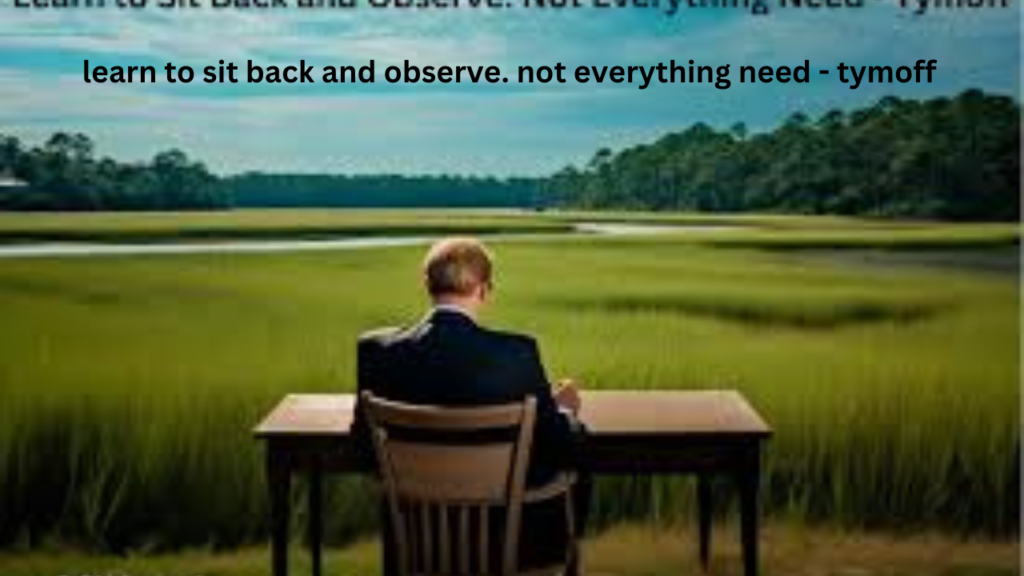In today’s fast-paced world, we often feel pressured to act immediately, to respond to every situation, and to fix things right away. Yet, there’s wisdom in holding back, taking a breath, and simply observing. As the saying goes, “learn to sit back and observe. not everything need – tymoff.” This is more than just a catchy phrase—it’s a reminder that not everything demands an instant response, and sometimes, the best action is no action at all.
Why It’s Important to Observe Before Acting
In life, we’re constantly presented with challenges and decisions. From work-related stresses to personal dilemmas, it’s easy to feel the need to jump into action. But learning to sit back and observe before making a move can be one of the most powerful tools for personal growth.
When we rush, we often miss critical details. We might make decisions based on incomplete information, or worse, based on our emotions. Emotions can cloud judgment, and in the heat of the moment, it’s hard to see the bigger picture. That’s why it’s so important to pause. “Learn to sit back and observe. not everything need – tymoff” encourages us to do just that—take a moment to gather all the facts, understand the situation, and then decide if action is even necessary.
The Power of Observation in Personal Relationships
One of the most common areas where immediate reactions can lead to misunderstandings is in personal relationships. A simple miscommunication can quickly escalate into a full-blown argument if we don’t take the time to observe the situation first.
For instance, when someone says something hurtful, our instinct might be to react defensively or lash out. But if we learn to sit back and observe, we might notice that the comment wasn’t intended to harm us, or that the other person is dealing with their own issues. By observing, we give ourselves the space to respond with understanding rather than defensiveness.
“Learn to sit back and observe. not everything need – tymoff” is a valuable principle for anyone looking to improve their relationships. It teaches us that not every comment requires a rebuttal, and not every situation needs our input. Sometimes, silence and reflection are more powerful than words.
How This Approach Enhances Decision-Making
When it comes to making decisions, whether in business or personal life, the ability to observe and gather information is critical. Successful decision-makers often spend more time observing than acting. They understand that rushing into decisions without proper analysis can lead to mistakes.
Take, for example, a business leader faced with a sudden crisis. Instead of reacting impulsively, the best course of action is often to gather all the facts, consult with experts, and observe the unfolding situation. By taking a step back, they can make a more informed, rational decision that benefits the organization in the long term.
The principle of “learn to sit back and observe. not everything need – tymoff” is especially useful here. It reminds us that decisions made in haste are often regretted. In contrast, decisions made after careful observation are more likely to succeed.
Mindfulness: The Art of Sitting Back and Observing
The idea behind “learn to sit back and observe. not everything need – tymoff” aligns closely with the practice of mindfulness. Mindfulness teaches us to live in the present moment, to observe our thoughts and feelings without judgment, and to let go of the need to control everything.
In moments of stress or anxiety, mindfulness can be a powerful tool. By sitting back and observing our thoughts, we can recognize patterns that lead to stress and anxiety. This gives us the opportunity to change those patterns and respond to situations more calmly and effectively.
Mindfulness also helps us break the cycle of reactivity. Instead of reacting automatically to every situation, we can observe our impulses and make conscious choices about how to respond. This leads to more thoughtful, deliberate actions that align with our long-term goals.
When Inaction Is the Best Action
Sometimes, the best thing we can do is nothing at all. In a world that glorifies productivity and busyness, this idea might seem counterintuitive. But “learn to sit back and observe. not everything need – tymoff” reminds us that inaction can be a powerful tool.
Inaction allows us to let things unfold naturally, without interference. It gives us the space to gain new perspectives, allowing us to make more thoughtful, measured decisions. Moreover, inaction can prevent unnecessary stress and conflict. By choosing not to engage in every battle or respond to every slight, we free ourselves from the constant pressure to perform.
Conclusion
The phrase “learn to sit back and observe. not everything need – tymoff” serves as a reminder that we don’t have to respond to everything that comes our way. Sometimes, the most productive action is to observe, reflect, and then decide if a response is necessary. This approach not only helps us make better decisions but also improves our relationships and mental well-being.
By practicing observation and mindfulness, we can navigate life’s challenges with greater clarity and peace. So the next time you feel the urge to react, remember to pause, sit back, and observe—you might be surprised by what you learn.
